Passive Voice
Passive Voice
g ' day fellas ! my name is Dearni, here i will explain to all readers about passive active. So yap, lets get start it !
What is the Passive Voice ?
In general, the active voice makes your writing stronger, more direct, and, you guessed it, more active. The subject is something, or it does the action of the verb in the sentence. With the passive voice, the subject is acted upon by some other performer of the verb. (In case you weren’t paying attention, the previous two sentences use the type of voice they describe.)
Passive voice is a form of sentence where the subject of the sentence takes action, not takes action. The passive voice is used to show interest in a person or object that is subjected to an action and not a person or object performing the action. So, the most important thing or person will be the subject of the sentence.
Purpose Of Passive Voice ?

The passive voice is used when we want to emphasize the action (the verb) and the object of a sentence rather than subject. This means that the subject is either less important than the action itself or that we don’t know who or what the subject is.
The Difference Between Active and Passive Voice
While tense is all about time references, voice describes whether the grammatical subject of a clause performs or receives the action of the verb. Here’s the formula for the active voice:
- [subject] + [verb (performed by the subject)] + [optional object]
Example : Chester kicked the ball.
In a passive voice construction, the grammatical subject of the clause receives the action of the verb. So, the ball from the above sentence, which is receiving the action, becomes the subject. The formula:
- [subject]+[some form of the verb to be]+[past participle of a transitive verb]+[optional prepositional phrase]
Example : The ball was kicked by Chester.
That last little bit—“by Chester”—is a prepositional phrase that tells you who the performer of the action is. But even though Chester is the one doing the kicking, he’s no longer the grammatical subject. A passive voice construction can even drop him from the sentence entirely:
Although the passive voice is less common than the active voice, there are several good reasons to sometimes use the passive. On this page we look at how to construct the passive voice and when and why to use it.
How do we make the passive ?
The basic structure of a passive clause is very simple:
The auxiliary be is conjugated in all tenses. The main verb is always the past participle. The agent is the original "doer" of the action.
Look at some examples:
Notice above↑:
- auxiliary be can be conjugated for all persons and tenses
- main verb is invariable: past participle
- if there is an agent (Apple, Head Office), it is introduced by by
Forming the Passive Voice
The passive voice is not a tense in English. Each tense has its own passive voice which is created by using a form of the auxiliary verb to be + V3 (past participle).
The passive voice in each tense:

All of the rules for passive negatives and questions are the same as for the active voice.
Note : Verbs that have no object (no one to “receive” the action) cannot be put into the passive, such as, arrive, come, die, exist, go, happen, have, live, occur sleep, etc.
Use of the Passive Voice ?
1. we want to emphasize the receiver of the action:
- President Kennedy was killed by Lee Harvey Oswald.
cf: Lee Harvey Oswald killed President Kennedy.
2. we don't know who did the action (the agent):
- My wallet has been stolen.
cf: Somebody has stolen my wallet.
3. we think the agent is not important or interesting:
- Our house is being painted.
cf: XYZ Company is painting our house.
4. the agent is obvious:
- I am paid weekly.
cf: My company pays me weekly.
5. we are making general statements or announcements:
- Passengers are reminded to fasten their seatbelts.
cf: The Captain reminds passengers to fasten their seatbelts.
6. the agent is everyone:
- The emergency services can be called by dialling 999.
cf: The public can call the emergency services by dialling 999.
7. we are writing formal or scientific texts:
- Potassium was added and mixed in. The solution was heated to 80°C and then allowed to cool.
cf: The technician added potassium and mixed it in. The technician heated the solution to 80°C and then allowed it to cool.
8. we want to avoid responsibility for our own actions (typically found in government reports):
- Mistakes were made and unfortunately never rectified.
cf: The Prime Minister made mistakes and unfortunately never rectified them.
ok readers. that's all my explanation about passive voice. I hope y'all understand with my explanation. thankyouuuu !




Komentar
Posting Komentar